高考英语语法专题复习十三简单句并列句及附加疑问句
高考英语语法复习:简单句、并列句、三大从句及特殊句式
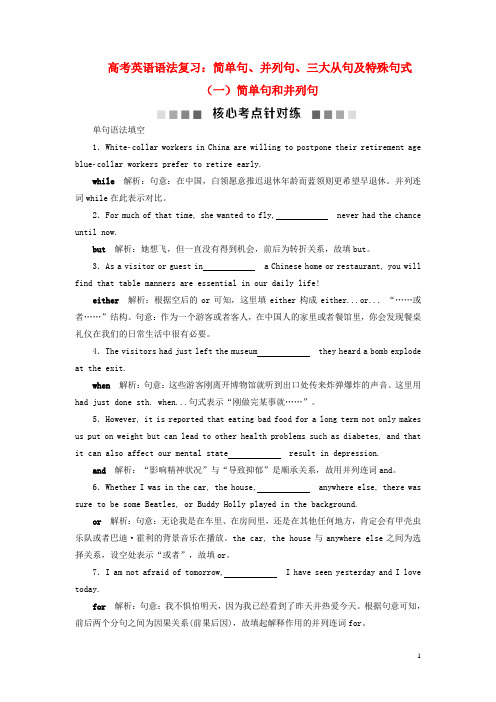
高考英语语法复习:简单句、并列句、三大从句及特殊句式(一)简单句和并列句单句语法填空1.Whitecollar workers in China are willing to postpone their retirement age bluecollar workers prefer to retire early.while解析:句意:在中国,白领愿意推迟退休年龄而蓝领则更希望早退休。
并列连词while在此表示对比。
2.For much of that time, she wanted to fly, never had the chance until now.but解析:她想飞,但一直没有得到机会,前后为转折关系,故填but。
3.As a visitor or guest in a Chinese home or restaurant, you will find that table manners are essential in our daily life!either解析:根据空后的or可知,这里填either构成either...or... “……或者……”结构。
句意:作为一个游客或者客人,在中国人的家里或者餐馆里,你会发现餐桌礼仪在我们的日常生活中很有必要。
4.The visitors had just left the museum they heard a bomb explode at the exit.when解析:句意:这些游客刚离开博物馆就听到出口处传来炸弹爆炸的声音。
这里用had just done sth. when...句式表示“刚做完某事就……”。
5.However, it is reported that eating bad food for a long term not only makes us put on weight but can lead to other health problems such as diabetes, and that it can also affect our mental state result in depression.and解析:“影响精神状况”与“导致抑郁”是顺承关系,故用并列连词and。
高考英语复习句子分类之简单句,并列句和复合句知识点
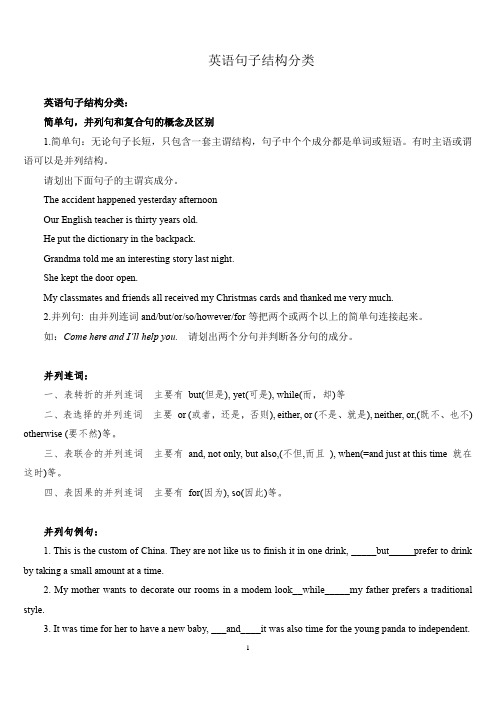
英语句子结构分类英语句子结构分类:简单句,并列句和复合句的概念及区别1.简单句:无论句子长短,只包含一套主谓结构,句子中个个成分都是单词或短语。
有时主语或谓语可以是并列结构。
请划出下面句子的主谓宾成分。
The accident happened yesterday afternoonOur English teacher is thirty years old.He put the dictionary in the backpack.Grandma told me an interesting story last night.She kept the door open.My classmates and friends all received my Christmas cards and thanked me very much.2.并列句: 由并列连词and/but/or/so/however/for等把两个或两个以上的简单句连接起来。
如:Come here and I’ll help you. 请划出两个分句并判断各分句的成分。
并列连词:一、表转折的并列连词主要有but(但是), yet(可是), while(而,却)等二、表选择的并列连词主要or (或者,还是,否则), either, or (不是、就是), neither, or,(既不、也不) otherwise (要不然)等。
三、表联合的并列连词主要有and, not only, but also,(不但,而且), when(=and just at this time 就在这时)等。
四、表因果的并列连词主要有for(因为), so(因此)等。
并列句例句:1. This is the custom of China. They are not like us to finish it in one drink, _____but_____prefer to drink by taking a small amount at a time.2. My mother wants to decorate our rooms in a modem look__while_____my father prefers a traditional style.3. It was time for her to have a new baby, ___and____it was also time for the young panda to independent.4. He is a shy man,__but/yet_______he is not afraid of anything or anyone. 解析:But/yet转折连词。
高考英语语法复习 ---简单句并列句复合句
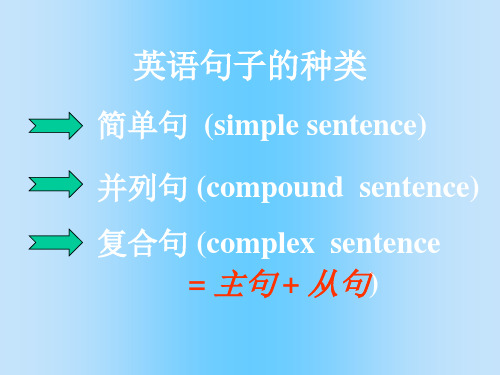
(武汉调研4月) Put yourself in situations where you will be forced to communicate in English, ___ you will see more progress over time. A. or B. so C. yet D. and (崇文4月) You must get up early in the morning, ___ we’ll have to leave without you A.and B. but C. or D. so
英语句子的种类
简单句 (simple sentence) 并列句 (compound sentence)
复合句 (complex sentence = 主句 + 从句)
简单句的五种基本句型
• 主语 + 不及物动词 ( S + Vi ) • 主语 + 及物动词 +宾语 ( S + Vt + O) • 主语 + 系动词 + 表 (S + LV + predicative) • 主语+双宾动词+间宾+直宾(S +Vt +O.indir+O. dir) • 主语 + 宾补动词 +宾语 +宾语补语 • (S + Vt. + O + O. compl) •There + be / stand/ lie / live...
其它平行结构:not…but…, either…or…, neither…nor, not only…but also…, would rather…than…(宁愿……不愿 ……), rather than(而不), as well as(既……也……)等。
高考句型背诵

注③:第一类可以改为由 to 引导的短语;第二类可以改为由 for 引导的短语。
注④:间接宾语用介词词组表示的场合: a. 对间接宾语加以强调时:
I’ve bought it for you, not for myself. I’ll hand this letter to the secretary and not to the director. b. 当直接宾语是一个人称代词时: I’ll send it to you tomorrow. You’d better hand it directly to the headmaster. c. 当直接宾语比间接宾语短时: She showed the picture to the students sitting near her. d. 当间接宾语置于句首时: Who did you send it to? To him I told the story, not to his brother. e. 当间接宾语和直接宾语都是代词时: He gave it to me. I’ll lend them to you.
二、表语 表语可以用下面这些东西表示:
1. 名词;2. 代词;3. 数词;4. 动名词;5. 不定式; 6. 词组; 7. 从句; 8. 形容词;9. 分词; 10. 副词;11. 介词短语;如: The masses are the real heroes. That’s something we have always to keep in mind. She was the first to learn about it. My idea is this. Time is pressing. Let’s hurry up. / They were excited at the news. All I could do was send him a telegram. We must be off now. They are twice the size of chickens. My idea is that we should stick to our original plan.
高中英语语法详解精练 13 第十三章 并列句

第十三章并列句要点概览◎并列句的分类○表示连接两个同等概念○表示选择○表示转折○表示因果○表示条件或结果◎并列句中的省略○省略主语○省略整个谓语或者谓语的主要部分○省略谓语中的助动词○省略谓语中的主要动词○省略宾语○省略状语知识讲解含有两个或更多的相互并列的主谓结构的句子,叫做并列句。
换句话说,它是由两个或更多个并列的简单句构成的。
各分句靠连词和逗号、分号来连接,其基本结构为:分句+并列连词十分句。
在并列句中,常用的连接词有并列连词,如:and,but,or,while,for,so,neither,nor等,还有连接副词,如:still,yet,however,therefore(因此),then等。
一些相当于连接词的词组,如:on the contrary(相反),not only…but also(不仅……而且)等。
一、并列句的分类1.表示连接两个同等概念常用and,not only..,but also,neither...nor,so等。
The teach er’s name is Smith,and the student’s is John. 老师的名字是史密斯,学生的名字是约翰。
Not only did the restaurant overcharge me,but they hadn’t served me well. 餐馆不仅要价太高,而且对我的服务也不周到。
Neither has he changed his mind,nor will he do so. 他既没有改变主意,也不打算这样做。
Jim plays football and so does his brother. 吉姆踢足球,他的兄弟也踢足球。
when the bell rang.他正要说话时On one hand l have to work,on the Other hand,I have a great many visitors.一方面我得工作,另一方面我又有许多来访者。
高中英语语法专题知识点梳理总结与练习(并列句、定语从句、名词性从句、状语从句)
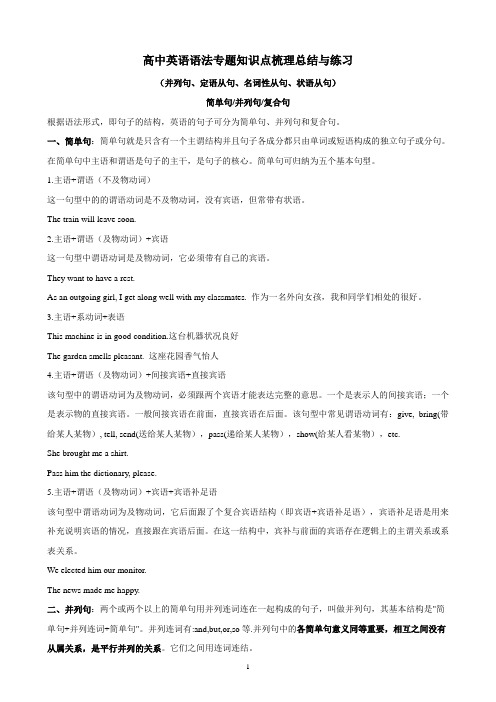
高中英语语法专题知识点梳理总结与练习(并列句、定语从句、名词性从句、状语从句)简单句/并列句/复合句根据语法形式,即句子的结构,英语的句子可分为简单句、并列句和复合句。
一、简单句:简单句就是只含有一个主谓结构并且句子各成分都只由单词或短语构成的独立句子或分句。
在简单句中主语和谓语是句子的主干,是句子的核心。
简单句可归纳为五个基本句型。
1.主语+谓语(不及物动词)这一句型中的的谓语动词是不及物动词,没有宾语,但常带有状语。
The train will leave soon.2.主语+谓语(及物动词)+宾语这一句型中谓语动词是及物动词,它必须带有自己的宾语。
They want to have a rest.As an outgoing girl, I get along well with my classmates. 作为一名外向女孩,我和同学们相处的很好。
3.主语+系动词+表语This machine is in good condition.这台机器状况良好The garden smells pleasant. 这座花园香气怡人4.主语+谓语(及物动词)+间接宾语+直接宾语该句型中的谓语动词为及物动词,必须跟两个宾语才能表达完整的意思。
一个是表示人的间接宾语;一个是表示物的直接宾语。
一般间接宾语在前面,直接宾语在后面。
该句型中常见谓语动词有:give, bring(带给某人某物), tell, send(送给某人某物),pass(递给某人某物),show(给某人看某物),etc.She brought me a shirt.Pass him the dictionary, please.5.主语+谓语(及物动词)+宾语+宾语补足语该句型中谓语动词为及物动词,它后面跟了个复合宾语结构(即宾语+宾语补足语),宾语补足语是用来补充说明宾语的情况,直接跟在宾语后面。
在这一结构中,宾补与前面的宾语存在逻辑上的主谓关系或系表关系。
高考英语语法句子类型及句子成分基础知识
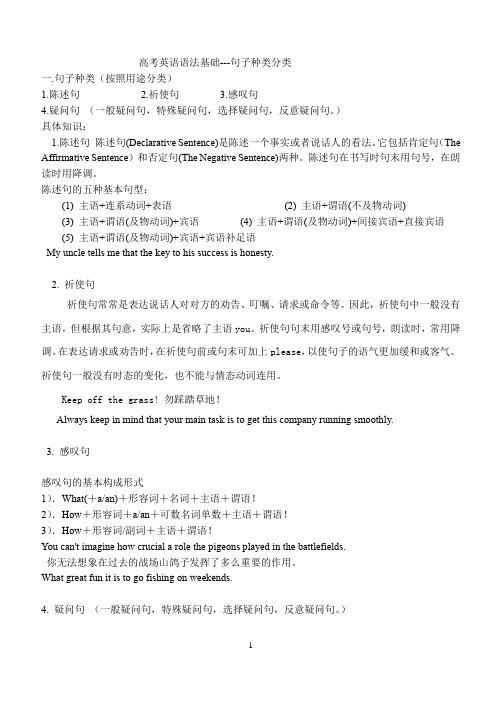
高考英语语法基础---句子种类分类一.句子种类(按照用途分类)1.陈述句2.祈使句3.感叹句4.疑问句(一般疑问句,特殊疑问句,选择疑问句,反意疑问句。
)具体知识:1.陈述句陈述句(Declarative Sentence)是陈述一个事实或者说话人的看法。
它包括肯定句(The Affirmative Sentence)和否定句(The Negative Sentence)两种。
陈述句在书写时句末用句号,在朗读时用降调。
陈述句的五种基本句型:(1) 主语+连系动词+表语(2) 主语+谓语(不及物动词)(3) 主语+谓语(及物动词)+宾语(4) 主语+谓语(及物动词)+间接宾语+直接宾语(5) 主语+谓语(及物动词)+宾语+宾语补足语My uncle tells me that the key to his success is honesty.2. 祈使句祈使句常常是表达说话人对对方的劝告、叮嘱、请求或命令等。
因此,祈使句中一般没有主语,但根据其句意,实际上是省略了主语you。
祈使句句末用感叹号或句号,朗读时,常用降调。
在表达请求或劝告时,在祈使句前或句末可加上please,以使句子的语气更加缓和或客气。
祈使句一般没有时态的变化,也不能与情态动词连用。
Keep off the grass! 勿踩踏草地!Always keep in mind that your main task is to get this company running smoothly.3. 感叹句感叹句的基本构成形式1).What(+a/an)+形容词+名词+主语+谓语!2).How+形容词+a/an+可数名词单数+主语+谓语!3).How+形容词/副词+主语+谓语!You can't imagine how crucial a role the pigeons played in the battlefields.你无法想象在过去的战场山鸽子发挥了多么重要的作用。
高考语法复习专练-简单句+并列句

高考语法复习专练(三)简单句并列句(一)1. Which book do you like, this one____ that one?A. andB. butC. soD. or2. She likes watching TV____ going to a movie.A. butB. andC. withD. so3. He likes oranges_______ he doesn't like bananas.A. andB. butC. orD. so4. I like action movies_____ my sister likes comedies.A. orB. soC. andD. with5. I want to buy a T-shirt____ a hat.A. butB. orC. withD. and6.Rather than ____ on a crowded bus, he always prefers ____ a bicycle.A.ride ; ride B.riding ; ride C.ride ; to ride D.to ride ; riding 7.The visiting Minister expressed his satisfaction with the talks, ____ that he had enjoyed his stay here.A.having added B.and to add C.and adding D.adding8.The weather turned out to be very good , ____ was more than we could expect.A.what B.which C.that D.it9.____ it with me and I'll see what I can do.A.When left B.Leaving C.If you leave D.Leave10.____ me the truth, or I'm not going to leave the room.A.Tell B.Telling C.To tell D.If you tell11.____ you come today ____ tomorrow, I don't mind at all.A.Neither; nor B.Both; and C.Either; or D.Whether; of12.T. S. Eliot was ____ .A.not only famous in Britain but also in AmericaB.not famous only in Britain but also in AmericaC.famous not only in Britain but also in AmericaD.not only famous in Britain but in America too13.Mother gave more pocket money to David than ____ .A.Lena B.to Lena C.gave to Lena D.gave Lena the money 14.To know what is good and ____ are two different things.A.doing what is right B.does what is rightC.to do what is right D.did what was right15.The man is either for me or ____ .A.against me B.against me C.says no to me D.he is against me 16.Shut up and ____ .A.you do your work B.have your work doneC.do your work D.to do your work17.______ , don't keep the windows open.A.While going to sleep B.As sleepingC.When you will be sleep D.While sleeping18.She thought I was talking about her daughter, ______ , in fact, I was talking about my daughter.A.whom B.where C.which D.while19. -- ______ is your English teacher like?--He is tall and thin.A. HowB. WhatC. WhichD. /20.-- ______do you like the new play?--It's good and interesting.A. HowB. WhichC. WhatD. Whom21. ______ you like to go to the cinema with us?A. WillB. WouldC. HowD. What22. --_____ do you go swimming in summer?--Seldom.A. How longB. How oftenC. How soonD. When23. --______ will it take the boy to finish his homework?--For about an hour.A. How soonB. How oftenC. How longD. When24. --______ do you clean the house?--Once a day.A. How soonB. How many timesC. How longD. How often25. --______ will you be able to finish the composition?--In two hours.A. How farB. How oftenC. How soonD. How long26. ___ she sings!A. What beautifulB. How beautifulC. What beautifullyD. How beautifully27. ___ proud he is!A. What aB. WhatC. How aD. How28. ____fine day!A. WhatB. What aC. HowD. How a29. ___ easy job he is doing!A. What aB. What anC. WhatD. How30. ___ wonderful weather it is!A. What aB. WhatC. How aD. How31. ___ friendly she is to everyone!A. What aB. WhatC. How aD. How32.What beautiful weather, _________?33.You must have studied English for many years, _________?34.you dare do it, ___________?35.We may go to the cinema, ___________?36.You dare do it, _____________?37.You did do your homework yesterday, __________?38.We mustn’t be late, ____________?39.Everyone’s having a good time, __________?40.They don’t need to go there, ___________?41.This is a lovely garden, __________?42.I don’t believe she knows it, _____________?43.He failed in the exam, ____________?44.She is unhappy, ____________?45.John said nobody was fit for the job, _________?46.You’d rather I didn’t say anythi ng, ____________?47.You couldn’t lend me a novel, _____________?48.He hardly knew about it, ____________?49.There is nothing wrong with your radio, _________?50. Go to the cinema now, ___________?高考语法复习专练(三)简单句并列句(二)1.Lend me your bike, ________?2.Let’s have a walk, ________?3.Let us do it by ourselves, __________?4.I’m a teacher, _________?5.She never said she would go there, __________?6.His brother hasn’t any books, __________?7.We’d be tter have a word with him, _________?8.You’d like some tea, __________?9.I don’t think they can finish the work, ________?10.Nobody called on me, ____________?11.Somebody is waiting for you, __________?12.There won’t be any trouble, ____________?13.Nothing can stop us now, _____________?14.Everything is all right, _____________?15.She has few good reasons for staying, __________?16.He seldom goes home, ___________?17.You used to get up early, __________?18.She doesn’t dare to ask me, ___________?19.There used to be a church behind the cemetery, _______?20.We had to take the first train, __________?21.My brother often has colds, __________?22.I must answer the letter, _________?23.We ought to read this book, _________?24.You must have stayed at home last night, _________?25.Something’ll have to be done about the price, _________?26.They must be hungry, __________?27.I suppose you know the meaning of the word, _________?28.We’ve saved nothing this year, ___________?29.Don’t forget to phone me, ____________?30.Let me go, ____________?31. I help him___ he helps me. We help each other .A. butB. andC. orD. though32. ___ he ___ I am a doctor.A. Both; andB. Either; norC. Neither; norD. Neither; and33. Some of us would like to act the story ___ it isn't finished yet.A. butB. andC. thoughD. so34. One more week, ___ we will finish the task.A. orB. so thatC. andD. if35. Tom is ___ than John.A. not clevererB. no cleverC. cleverD. not clever36. The two girls are only two years old. This girl is ___ than that one.A. no tallerB. as tallC. so tallD. more taller37. Some apples are ___ than these oranges.A. no biggerB. bigC. smallD. much big38. We always keep our classroom clean. So we ___ clean it every day.A. don't haveB. don't have toC. have notD. have not to39. --___ did you sleep last night?--I stayed up too late to go to sleep.A. HowB. WhyC. WhenD. Where40. I don't think you two have met before, ___?A. do IB. do youC. have youD. have I41. He doesn't think I have broken the glass, ___?A. does heB. doesn't heC. have ID. haven't I42. I think Tom will come in a minute, ____?A. do IB. don't IC. will heD. won't he43. I don't suppose that he will come this afternoon, ____?A. do youB. will heC. won't heD. doesn't he44. You must be a writer, ___?A. will youB. won't youC. aren't youD. must you45. I wish to go to the cinema, _____?A. can IB. will youC. may ID. shall I46. Be careful, ________ you'll fail in the examination.47.________ does she sing well , ________ she dances well.48.Mary was a nice girl , ________ she had one shortcoming.49.We have won great victories, ________ more serious struggles are still ahead of us. 50.It took us a long time to get there, ________ it was a long way to go.51.I have read one of his novels ________ a few of his plays.52.I don't know him, ________do I know where he comes from.53.It rained; ________ the game was called off.54.Get to the top of the hill, ________ you can see the whole city of Jinan clearly. 55.Our head teacher is ________ our teacher ________ our father.高考语法复习专练(三)简单句并列句(一)答案1. D2. B3. B4. C5. D6.C prefer to do sth.7.D逗号前是句子, 逗号后跟分词短语, 表伴随8.B逗号后跟非限定从句9.D and前后各一句10.A or连接两句, 前句为祈使句11.D不能选C, either…or表示选择, 但逗号前后结构不正确12.C not only… but also连接对等成份13.B than后省去意义相同的部分14.C and连接两部分对等15.A or连接两个介词短语16.C and前后对等17.D强调在睡觉过程中18.D while表示对比19. B 20. A 21. B 22. B 23. C 24. D 25. C 26. D 27. D 28. B 29. B 30. B 31.D 32. isn’t you 33. haven’t you 34. daren’t you 35. mayn’t we36. daren’t you37. didn’t you38. must we 39. aren’t they40. do they 41. isn’t it42. does she 43. didn’t he 44. isn’t she 45. didn’t he 46. wouldn’t you47. could you 48. did he 49. is there 50. will you简单句并列句(二)答案1.will you2. shall we3. will you4. ar en’t I5. did she6. has he7. hadn’t we8. wouldn’t you 9. can they 10. did they 11. aren’t they 12. will there 13. can it14. isn’t it 15. has she 16. does he 17. usedn’t you /didn’t you / usen’t you 18. does she 19. didn’t there 20. didn’t we 21. doesn’t he 22. mustn’t I 23. oughtn’t we 24. didn’t you 25. won’t it 26. aren’t they27. don’t you 28. have we 29. will you 30. will/won’t you 31. B 32. C 33. A 34.C 35. A 36. A 37.A 38. B 39. A 40. C 41. A 42. D 43. B 44. C 45. C46 or or之前是祈使句, 之后是单句,前后是条件关系。
简单句、并列句、复合句
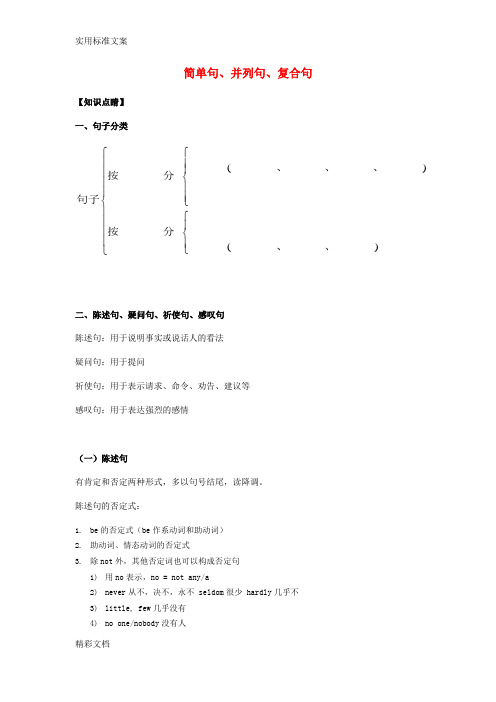
简单句、并列句、复合句【知识点睛】 一、句子分类____________(____________________________)____________________________________________(_____________________)⎧⎧⎪⎪⎪⎪⎨⎪⎪⎪⎪⎩⎨⎪⎧⎪⎪⎪⎨⎪⎪⎩⎩ 、、、 按分 句子按分 、、 二、陈述句、疑问句、祈使句、感叹句 陈述句:用于说明事实或说话人的看法 疑问句:用于提问祈使句:用于表示请求、命令、劝告、建议等 感叹句:用于表达强烈的感情(一)陈述句有肯定和否定两种形式,多以句号结尾,读降调。
陈述句的否定式:1. be 的否定式(be 作系动词和助动词)2. 助动词、情态动词的否定式3. 除not 外,其他否定词也可以构成否定句1) 用no 表示,no = not any/a2) never 从不,决不,永不 seldom 很少 hardly 几乎不 3) little, few 几乎没有 4) no one/nobody 没有人5)nothing什么也没有6)neither of…没有什么(两者都不);none of…没有任何,什么都没有(三者或三者以上都不)7)too…to…太……以至于不能……(二)疑问句1. 一般疑问句(1)用什么词提问,用什么词回答。
—Are you a student? 你是一个学生吗?—Yes, I am. 是的,我是。
/—No, I’m not. 不,我不是。
(2)否定的一般疑问句往往表示惊讶、赞叹、怀疑等语气。
(注意yes/no的翻译)—Don’t you watch TV at night? 你晚上不看电视吗?—Yes, I do. 不,我看电视。
/—No, I don’t. 是的,我不看电视。
(3)用其他词语代替yes/no,使语气更客气、委婉。
—Can you go to the movies with me? 你能和我一起去看电影吗?—I’m afraid not. I have much homework to do. 恐怕不行,我有很多作业要做。
简单句,并列句,复合句

十、简单句1、简单句的特点:简单句通常只由一个主语(或并列主语)和一个谓语(或并列谓语)构成。
2、简单句的种类:简单句一般分为陈述句、疑问句、感叹句和祈使句四种。
3、陈述句:用来说明一个事实的句子叫陈述句。
它有肯定式和否定式两种形式。
▲陈述句的肯定式:He is a middle school student.(他是个中学生)/ I have a hammer in my hand.(我手上有把锤子)/ She teaches us geography.(她教我们地理)/ The new play was good enough and everybody enjoyed it.(新的话剧非常好大家都喜欢)▲陈述句的否定式:1)谓语动词如果是be 、助动词、情态动词时,在它们的后面加“not”。
如:My brother is nota teacher.(我的弟弟不是教师)/ He does not have a cousin.(他没有堂兄弟)/ I will not go there tomorrow.(明天我不去那儿)/ My mother is not cooking a meal in the kitchen.(我母亲现在不在厨房里做饭)/ You must not make such mistakes again.(你不该再犯类似错误了)/ We haven’t discussed the question yet(我们还没有讨论那个问题呢).2)谓语动词如果没有上述词语而是其他动词时,须在它的前面加do not(don’t).如:I don’t know anything about it.(此事我一无所知) / Li Ming does not feed pigs in the countryside.(李明不在农村养猪)/ We didn’t expect to meet her right here.(我们没指望着在这里见到她)/ We didn’t have a meeting yesterday afternoon.(昨天下午我们没有开会)3)如果“have”作“有”讲,也可以在它后面加not构成否定式,其形式与have got的否定式相同。
英语句子成分及分类:简单句-并列句和复合句
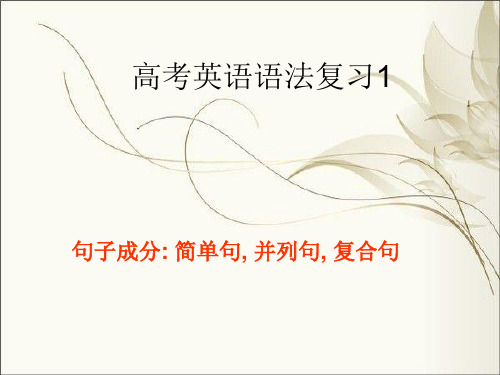
练习一
• 一、指出下列句子划线部分是什么句子成 分:
• 1. The students got on the school bus. • 2. He handed me the newspaper. • 3. I shall answer . What a beautiful Chinese painting! • 5. They went hunting together early in the
(五)宾语补足语
• 英语中有些及物动词,除有一个直接宾语 以外,还要有一个宾语补语,才能使句子 的意义完整。带有宾语补足语的一般句型 为:某些及物动词(如make等+宾语+宾 补)。宾补可由名词、形容词、副词、不 定式、分词、介词短语和从句充当。例如:
1. His father named him Dongming.(名词) 2. They painted their boat white.(形容词) 3. Let the fresh air in.(副词)
• 2、复合谓语:(1)由情态动词或其他助动 词加动词原形构成。如:You may keep the book for two weeks. He has caught a bad cold. (2) 由系动词加表语构成。如:We are students.
(三)表语
• 表语用以说明主语的身份、特征和状态, 它一般位于系动词(如be, become, get, look, grow, turn, seem等)之后。表语一般 由名词、代词、形容词、分词、数词、不 定式、动名词、介词短语、副词及表语从 句表示。例如:
morning.
• 6. His job is to train swimmers. • 7. He took many photos of the palaces in
2020高考英语课标:句子结构(简单句、并列句与复合句)

第一部分
专题十 句子结构(简单句、并列句与复合句)
考点整合
新题演练
-4-
突破点一 突破点二 突破点三 突破点四 突破点五
并列句 考查方向 1.常用并列连词and,but,so,or,otherwise,yet等的基本用法。 2.并列连词when 意为“这时/那时”,常用的三种句 型:(1)Sb.was/were doing...when...;(2)Sb.had(just) done...when...;(3)Sb.was/were about to do...when...。 如:We were about to rush away when the snake moved.
第一部分
专题十 句子结构(简单句、并列句与复合句)
考点整合
新题演练
-6-
突破点一 突破点二 突破点三 突破点四 突破点五
5.“祈使句+and/or/otherwise+简单句”句型。 在该句型中,前面的祈使句表示条件,后面的陈述句表示结果。 如果前后句表示顺延意义,中间的连词用and,相当于“if条件状语从 句+主句”;如果前后句表示转折意义,中间的连词用or,相当于“否定 的if条件状语从句+主句”。 如:Work hard and you will succeed.(If you work hard,you will
考点整合
新题演练
-7-
突破点一 突破点二 突破点三 突破点四 突破点五
经典例题
(2017·北京卷)—Peter,please send us postcards
we’ll know
where you have visited.
—No problem.
高三英语语法知识点:简单句和并列句
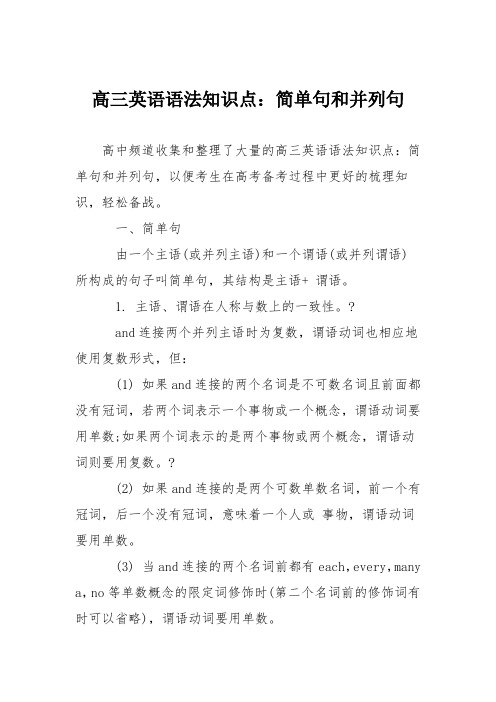
高三英语语法知识点:简单句和并列句高中频道收集和整理了大量的高三英语语法知识点:简单句和并列句,以便考生在高考备考过程中更好的梳理知识,轻松备战。
一、简单句由一个主语(或并列主语)和一个谓语(或并列谓语)所构成的句子叫简单句,其结构是主语+ 谓语。
1. 主语、谓语在人称与数上的一致性。
?and连接两个并列主语时为复数,谓语动词也相应地使用复数形式,但:(1) 如果and连接的两个名词是不可数名词且前面都没有冠词,若两个词表示一个事物或一个概念,谓语动词要用单数;如果两个词表示的是两个事物或两个概念,谓语动词则要用复数。
?(2) 如果and连接的是两个可数单数名词,前一个有冠词,后一个没有冠词,意味着一个人或事物,谓语动词要用单数。
(3) 当and连接的两个名词前都有each,every,many a,no等单数概念的限定词修饰时(第二个名词前的修饰词有时可以省略),谓语动词要用单数。
2. 陈述句与疑问句的转换。
3. 选择疑问句。
?4. 反意疑问句。
?(1) 陈述句+省略问句?(2) 祈使句+附加疑问句?(3) 反意疑问句的回答二、并列句由并列连词把两个或两个以上的互相关连而又互相独立的独句(即简单句)连在一起而构成的句子叫并列句。
其结构是:简单句+并列连词+简单句常用的连词有and,but,or not only...butalso,neither...nor,either...or并列句分为:联合并列句,转折并列句,选择并列句和因果并列句1. 联合并列句常由并列词and, not onlybut also...等连接如: Use your hand, and youll find a way.2. 转折并列句常由并列连词but, while, yet, whereas, nevertheless等连接如:I would love to have gone to the party last night but I had to work extra hours to finish a report.3. 选择疑问句常由并列连词or, otherwise,eitheror,等连接如:Either you leave this house or Ill call the police4. 因果并列句由并列连词so, for, therefore 等连接.如: it was late, so we went home.5. 在”祈使句+and/or+陈述句”结构中,当前后两部分间为承接关系时,用and;前后意思为相反关系时,用or.可将前面的祈使句转换成由if引导的条件状语从句,但必须将and 或or 去掉.如: Hurry up, and well be there in time.= If we hurry up, well be there in time.6. because和so; although, though和but 不能连用.。
高考英语语法---定语从句
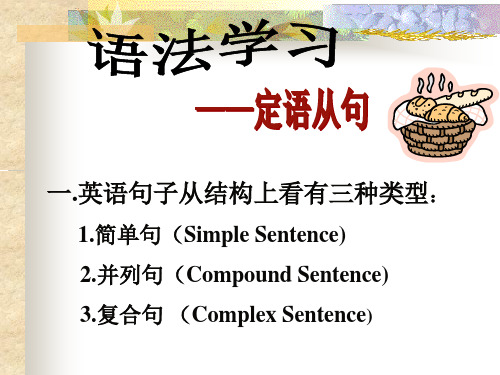
先行词为 引 导 关 词 系 副 词 关 系 代 词 who that whom which whose 人 物/人 人 物 某人/某物的 时间 地点 原因
在定语从句中作 主语 主语或宾语 宾语 宾语或主语 定语 状语 状语 状语 在从 句中 作宾 语可 省去
When Where why
关系代词和关系副词的作用
二、用法 1、关系代词引导的定语从句 关系代词所代替的先行词是人或物的名 词或代词,并在句中充当主语、宾语、定 语等成分。关系代词在定语从句中作主语 时,从句谓语动词的人称和数要和先行词 保持一致。 1)who(主格), whom(宾格), that 这些词代替的先行词是人的名词或代 词,在从句中作主语和宾语。例如:
The girl whose mother is a teacher works very hard. The room whose windows were broken was mine. In 1998,he returned to the small town where he grew up. I still remember the day when I met him for the first time. The reason why he missed the speech was that he didn’t catch the bus.
3)which, that 所代替的先行词是事物 的名词或代词,在从句中可作主语、宾语 等。 例如 : a) 这是 我们去年参观的) 工厂。 ( ①This is the factory. ②We visited it last year. This is the factory which / that we visited last year. 可以省略 说明:关系代词房屋。 ( )
高考英语语法句子类型及句子成分基础知识
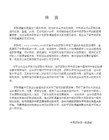
3).How+形容词/副词+主语+谓语!
You can't imagine how crucial a role the pigeons played in the battlefields.
你无法想象在过去的战场山鸽子发挥了多么重要的作用。
3)数词:Five is an odd number. Six is my favourite number.
4)不定式:To learn English well is important.
It is not easy to remember all rules.
1)名词:The students are learning grammar. Our teacher speaks very fast.
2)代词:She is writing. He likes playing tennis.
陈述句的五种基本句型:
(1) 主语+连系动词+表语 (2) 主语+谓语(不及物动词)
(3) 主语+谓语(及物动词)+宾语 (4) 主语+谓语(及物动词)+间接宾语+直接宾语
(5) 主语+谓语(及物动词)+宾语+宾语补足语
My uncle tells me that the key to his success is honesty.
高考英语语法基础---句子种类分类
一.句子种类(按照用途分类)
1.陈述句 2.祈使句 3.感叹句
4.疑问句 (一般疑问句,特殊疑问句,选择疑问句,反意疑问句。)
具体知识:
超实用高考英语复习语法专题:简单句和并列句
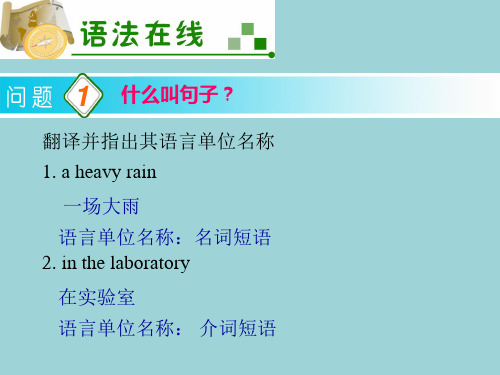
翻译并指出其语言单位名称 1. a heavy rain
一场大雨 语言单位名称:名词短语 2. in the laboratory 在实验室 语言单位名称: 介词短语
1
3. mentally and physically healthy 身心健康 语言单位名称:形容词短语
4. Stand up! 站起来! 语言单位名称:句子
这家合资企业给我提供了一个空缺职位。 成分:主+谓+间宾+直宾。
4. People call the USA “Uncle Sam”.
人们叫美国 “山姆大叔”。 成分:主+谓+宾+补。
6
5. HR is human resources for short. HR是人力资源的缩写。 成分:主系表(系表结构作合成谓语)。
7
2. 主+ V +非谓语动词。根据一个句子只能有 一个谓语动词的原则,当句子出现两个动词时,要 将其中一个根据其在句中语法作用变为非谓语动词: 动名词作主语或宾语;不定式作主语、宾语、宾补、 状语或定语;现在分词作状语或表语;过去分词作 状语或表语。
7
3. 主+ V +并列连词+ V。当句子出现两个谓 语动词时,可以根据动词间逻辑关系选用并列连词 连接两个谓语动词,构成连动式结构。
8
4.我市建行网点甚少,所以去建行办事需长时间 排队。 There are few branches of CBC in our city, so you have to wait in line for long before served.
5.红色和黄色是暖色而白色和蓝色是冷色。
Red and yellow are warm colors while white and blue are cold colors.
高考英语语法-附加疑问句

高考英语语法-附加疑问句1.当陈述部分的主语是I,而句子又用来征询对方的意见时,附加疑问句中的主语用you。
如: I find English very interesting, don't you?I don't like that film, do you?2.当陈述部分的主语是everybody, everyone, someone, nobody, n o one, somebody等合成代词时,附加疑问句中的主语通常用they。
但亦可用he,尤其是nobody, no one等作主语,具有否定概念时。
如:Somebody phoned while I was out, didn't they?Everyone enjoyed the party, didn't they?Nobody wants to go there, does he?3.当陈述部分的主语是不定代词everything, nothing, anything, s omething时,附加疑问句中的主语一般用it,不用they。
如:Everything seems all right now, doesn't it?Nothing is kept in good order, is it?Something must be done to stop pollution, isn't it?4.当陈述部分的主语是指示代词this, that或these, those时,附加疑问句中的主语分别用it和they。
如:This is important, isn't it? That isn't correct, is it?These are your friends Tom and Jack, aren't they?5.如果陈述部分是以代词one作主语,附加疑问句中的主语在正式场合用one,非正式场合用you,在美国英语中,在非正式场合还可以用he。
2020最新高考英语语法精讲精练精析-简单句并列句和反意疑问句

简单句、并列句和反意疑问句一、简单句简单句是指只包含一个主谓结构,而且句子的各个成分都只是单词和短语。
也就是说,如果一个句子里出现两个或更多并列的主语共同使用一个谓语,或一个主语后面接两个或多个并列的谓语,或者两个主语后面接两个谓语,我们都应视其为简单句。
Not only Tom but also his two sisters take great interest in piano. 不仅汤姆,而且他的两个姐姐也对钢琴感兴趣。
The man got up, put on his coat, hurried downstairs and run out into the street. 那个人起床,穿上大衣,匆匆忙忙下了楼,跑到了街上。
二、并列句并列复合句是由两个或两个以上并列而又独立的简单句构成。
两个简单句常由并列连接词连在一起,但有时不用连接词,只在两个简单句之间用一逗号或分号。
He hesitated for a moment before kicking the ball, otherwise he would have scored a goal. 在射门前他迟疑了一下,要不然的话,他就进了一球。
He came to my class every week, but his attitude suggested he was not really interested in the subject.每周他都会来上我的课,但从他的态度中我知道他对这门课程并不是真的感兴趣。
三、反意疑问句反意疑问句又叫附加疑问句,是指当提问的人对前面所叙述的事实不敢肯定,而需要向对方加以证实时所提出的问句。
其结构为:前一部分是一个陈述句,后一部分是一个简单问句。
完成后一部分简单问句时,要根据前面陈述句的动词时态和人称来选择适当的助动词进行提问,前后两部分的人称和动词时态要保持一致。
如果前一部分用肯定式,后一部分一般用否定式;反之,前一部分为否定式,后一部分要用肯定式,即“前肯定后否定,前否定后肯定”。
- 1、下载文档前请自行甄别文档内容的完整性,平台不提供额外的编辑、内容补充、找答案等附加服务。
- 2、"仅部分预览"的文档,不可在线预览部分如存在完整性等问题,可反馈申请退款(可完整预览的文档不适用该条件!)。
- 3、如文档侵犯您的权益,请联系客服反馈,我们会尽快为您处理(人工客服工作时间:9:00-18:30)。
语法专题十三简单句、并列句及附加疑问句一.简单句按照句子中动词的语法功能, 英语句子可归纳为五种基本句型, 各种各样的句子都可以看成是这五种句型的扩展. 学习, 掌握这五种基本句型, 对于认识英语句子的基本结构, 提高连词造句, 阅读理解和书面表达的能力将会有很大的帮助.五种基本句型:第一种: 主语+谓语第二种: 主语+谓语+宾语第三种: 主语+谓语+表语第四种: 主语+谓语+间接宾语+直接宾语第五种: 主语+谓语+宾语+宾语补足语1.主语+谓语(不及物动词)在这个句型中的动词是不及物的行为动词, 不能带宾语. 这种动词表示主语的行为动作, 意义基本完整, 所以不再需要宾语. 不及物动词没有被动语态形式. 在这个句型中, 谓语后面有时不再附加任何成分, 而大多数情况下有状语性质的修饰语. 这种修饰语可以由副词, 介词短语, 不定式短语, 分词短语以及从句等来担任. 例如:Tom is writing. (Little Tom is writing at the desk now.)He stopped. (He stopped to have a look.)The boy stood there, begging. (The boy whose parents died stood there, begging.)2.主语+谓语+宾语本句型中的及物动词同样也为行为动词, 表明一个具体实在的动作, 但其本身所表示的意义并不完整, 需要有一个宾语, 才能表达一个完整的概念. 例如:We have a TV set.You may use my pen. I will use hers.He doesn’t like the first. He likes the third.3.主语+系动词+表语在本句型中, 由系动词及表语构成表性状的复合谓语, 说明主语的身份, 特征, 性质, 状态等. 英语中除了最常见的系动词be以外, 还有表示感官的连系动词look, feel, sound, taste, smell等; 表示变化的连系动词get, turn, become, grow, fall, come等; 表示状态的连系动词keep, remain, stay, continue, seem等. 例如:Rose is an English boy.The boy looks like his father.4.主语+谓语+间接宾语+直接宾语有些动词后面, 可以有两个宾语, 这个宾语一个指人, 一个指物, 指人的叫间接宾语, 表示动作的方向和目标; 指物的叫直接宾语, 表示动作的承受者, 间接宾语一般放在直接宾语之前. 例如:She brought me some fruit.Can you do us a favour?这两个句子中的间接宾语都可以变成介词短语放在直接宾语后面. 例如:She brought some fruit to me.Can you do a favour for me?5.主语+谓语+宾语+宾语补足语宾语和补足语之间的关系是逻辑上的主谓关系, 即宾语是宾语补足语的逻辑主语。
句型中的宾语常用名词或代词宾格. 常用来作宾语补足语的成分有名词, 形容词,动词不定式, 现在分词, 过去分词, 介词短语和副词等. 例如:She named her baby John.We elected him monitor of our class.Keep the room clean and tidy, please.We consider it a pity that they have given up trying it a second time.His father wished him to be a musician.二.并列句连词是高考的重点考查项目之一.连词分为并列连词和从属连词两种. 如果句子包含两个或更多的互不依从的主谓结构, 就是并列句. 并列句中的分句通常用一个并列连词来连接, 其中的各分句意义同等重要. 联系密切. 无从属关系. 使用是特别注意其连词特性.a)and, not only…but (also)…neither, nor, neither……nor……等词连接的并列句,在意义上主要对前一句子作补充或引申, 包括肯定和否定两方面的意义. 例如One day, I was late, and my teacher war angry.Think it over, and you’ll find a way out.Not only is he himself interested in the subject, but also his students began to show interest in it.Neither does he work hard, nor does his brother.b)or, either……or……连接并列句表示选择. 例如:The children can go with us, or they can stay in. (选择)The workers were cheerful, or at least they appeared to be cheerful. (换个说法)Be careful, or you will break your neck. (否定条件)三.反意疑问句反意疑问句的一般应用规则为: 前面陈述部分是肯定句形式, 后面的附加疑问部分则用否定形式; 前面陈述部分如果用否定形式, 后面的附加疑问部分则用肯定形式, 但是在实际运用中, 只知道一般的应用规则还不够, 以下几种特殊情况应特别注意:a)当陈述部分的主语是指示代词this, that, these, those时, 疑问部分的主语, 不再用指示代词, 而要用it或者they代替. 例如:That isn’t your dictionary, is it?These are interesting stories, aren’t they?b)当陈述部分的主语是“I am…”结构时, 疑问部分一般用“aren’t I?”. 例如:I’m late for class, aren’t I?I’m doing well, aren’t I?c)当陈述句部分的主语是everybody, somebody, nobody, none等合成代词时, 疑问部分的主语多用they, 例如:Everyone came here, didn’t they?Nobody phoned while I was out, did they?d)当陈述部分的主语是everything, anything, nothing等不定代词时, 疑问部分的主语用it. 例如:Nothing is too difficult for him, is it?Everything is read, isn’t it?e)当陈述部分是不定代词one作主语, 疑问部分的主语在正式场合用one, 在非正式场合用you. 例如:One can’t be too careful, can one (you)?f)当陈述部分是“there be+主语+其他”结构时, 疑问部分用“be (not) +there.”例如:There is a book on the desk, isn’t there?There are not any pens in the box, are there?g)当陈述部分的主语是“I don’t think (suppose, believe, guess) +that从句结构时, 疑问部分的主语和谓语须和从句中的主语和谓语在人称和数上一致, 并且还要用肯定形式. 例如:I don’t think he can finish the work, can he?I don’t believe she knows it, does she?h)当陈述部分的谓语动词是have时, 有两种情况:have作“有”解时, 可有两种形式, 例如:He has a new book, hasn’t he/doesn’t he?have表达其他意思时, 只用do的相应形式. 例如:She had a good time in the park, didn’t she?[高考示例]【例一】2005 全国高考They wanted to charge $5000 for the, ______we managed to bring the price down.A. butB. soC. whenD. since提示: 此题考查并列连词使用. 前后两个句子存在转折关系, 故用转折连词but.答案:A【例二】2005 北京高考---Somebody wants you on the telephone.---______no one knows I’m here.A. ForB. AndC. ButD. So提示: 此题语境为: 一方说: 有人电话找你 . 另一方说: 但是没人知道我在这里呀! 前后两个句子存在转折关系. 故选C.答案: C【例三】2004 上海高考Bill’s aim is to inform the viewers that cigarette advertising on TV is illegal, ______?A. isn’t itB. is itC. isn’t heD. is he提示: 根据前肯定后否定的原则, 首先排除 B.D 两项. 再根据“宾语从句的反意疑问句用什么词反问, 综合要看主句的主语, 只有主句的主语是第一人称时, 才看从句主语”的原则, 排除C.答案: A【例四】(经典回放)Brian told you that there wasn’t anyone in the room at that time, ______?A. was thereB. wasn’t thereC. didn’t heD. did he提示: 此题考查主从复合句中的反问句式的问题. 一般规律是: 反问句的形式要与主句的主语一致, 但是当主句的主语是I, 谓语是think/suppose/believe/hope/expect/guess/know/be told/feel时, 反问句的形式与它们后面的宾语从句的主语和谓语保持相同.答案:D【例五】(经典回放)---I hear you’ve got a set of valuable Australian coins.______I have a look? ---Yes, certainly.A. DoB. MayC. ShallD. Should提示: 此题考查简单句中的交际用语. May I …? 表示请求对方的许可; Shall I…表示提供帮助, 提出建议, 要求给以知识和征求意见.答案: B[触类旁通]1.Yes. We have to say we are now facing unexpected difficulties ahead, but we firmlybelieve nothing can stop us from serving the people heart and soul, ______?A. can itB. can’tC. can theyD. can’t they2. I don’t think Thomas Edison could have done such a stupid thing last night,______?A. do IB. could heC. did heD. has he3. Please excuse me for my breaking in, ______I have something very important totell you.A. soB. andC. butD. yet4. The Chinese are good at playing table tennis ______the English are interestedin football.A. ifB. asC. whileD. since5. --I don’t like beef ______mutton.--I don’t like beef either, ______I like mutton very much.A. and; andB. and; butC. or; andD. or; but6. I’m very excited to know “S. H. E.”is going to sing at the CCTV Spring FestivalSoiree, ______?A. aren’t IB. am not IC. aren’t youD. are you7. -–Can you tell me how to learn English well?--Do more speaking, I think, ______you’ll be good at spoken English.A. orB. forC. andD. until8. --The street is too bad, isn’t it?-- ______, ______it’s a bit too crowded.A. No; butB. Yes; butC. No; becauseD. Yes; though答案: 1.A 2.C 3.C 4.C 5.D 6.A 7.C 8.A。
